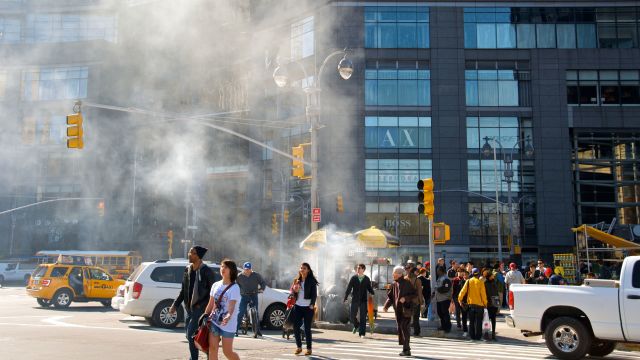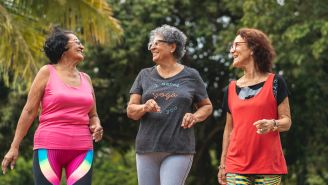Updated on March 8, 2024.
Walking is a nearly perfect exercise, especially for older adults. It strengthens muscles, helps you manage your weight, improves your balance, and lowers your risk for falls.
But research suggests that where you walk can be just as important as the walk itself. In a 2018 study published in The Lancet, researchers learned that walking in a traffic-clogged city with polluted air might do more harm than good for older adults who have respiratory illnesses or heart disease.
In fact, even just two hours of exposure to air polluted with soot or dust appears to erase the benefits that walking offers for the hearts and lungs of people aged 60 and older.
How the study worked
For the study, funded by the British Heart Foundation, researchers recruited 119 older adults. Forty of the volunteers were healthy, 40 had stable chronic obstructive pulmonary disease (COPD), and 39 had stable ischemic heart disease, a condition marked by narrowed arteries that restrict blood flow to the heart.
The participants were randomly assigned to walk for two hours along the western end of London’s Oxford Street, where diesel-powered buses and taxis are the only vehicles allowed to operate. Another group walked through a traffic-free section of Hyde Park in the center of London.
Three to eight weeks later, the groups switched. The park-walkers moved to the traffic areas and those who’d walked in the traffic strolled in the park.
Before and after each walk, researchers measured the traffic-related air pollution (including black carbon, nitrogen dioxide, and other matter) in the air.
Breaking down the results
The healthy walkers who strolled Hyde Park experienced improvements in their lung capacity. Specifically, they had a 7.5 percent average increase in their FEV1 measurement, which is the maximum amount of air you can exhale in one second. What’s more, their arteries became less stiff. These improvements lasted for up to 26 hours.
On the other hand, the healthy Oxford Street walkers experienced only a tiny increase in their lung capacity, and their arteries stiffened by 7 percent. Researchers noted this effect was linked to their increased exposure to black carbon soot and ultrafine particles released by diesel exhaust.
Additionally, the people with COPD who walked along heavily-trafficked Oxford Street reported an increase in disturbing symptoms like coughing, thick mucus secretions, shortness of breath, and wheezing. Their arterial stiffness also worsened. Researchers linked these harmful effects to black carbon soot and ultrafine particles, just as they did for the healthy people who walked Oxford Street.
“This supports the view that fossil fuel combustion particles are particularly toxic to people with heart and lung disease,” the researchers noted.
Regarding participants with ischemic heart disease, arteries stiffened only for those who were not taking medication for their condition. That suggested to researchers that these drugs might have a protective effect against pollution’s damage, but they said that more research is needed.
“Taking medications which improve arterial stiffness, such as statins, ACE inhibitors, and calcium channel blockers may well reduce the adverse effects of air pollution in people with ischemic heart disease,” study author Professor Fan Chung of the National Heart and Lung Institute at Imperial College London said in a statement.
What it means for your daily walk
“Our findings indicate that in traffic-congested streets... the health benefits of walking do not always outweigh the risk from traffic pollution,” said Chung. He added that this should not prevent older people from walking, especially if it’s their only exercise. "We suggest that, where possible, older adults walk in parks or other green spaces away from busy roads."
The U.S. Department of Health and Human Services suggests that Americans get at least 150 minutes of moderate activity (such as walking) every week, or a minimum of 75 minutes of vigorous-intensity weekly activity, like jogging or hiking uphill. Keep in mind, however, even more regular physical activity provides greater health benefits. If you can't get outdoors, try an indoor track or a shopping mall, or add steps to your regular routine by taking the stairs when you can, walking to coworkers' desks, or even just pacing while you're on the phone. You don't have to move for long periods of time to reap the benefits. Even a two-minute stroll can help improve your health. Every minute of physical activity will also count toward your weekly goals.
In the meantime, working toward a cleaner environment can help everyone.
"Our study provides a clear message to improve the quality of air we all share," said Chung. He suggested that working to reduce emissions, as well as phasing out diesel-powered engines and replacing them with battery-powered alternatives, are good first steps.







